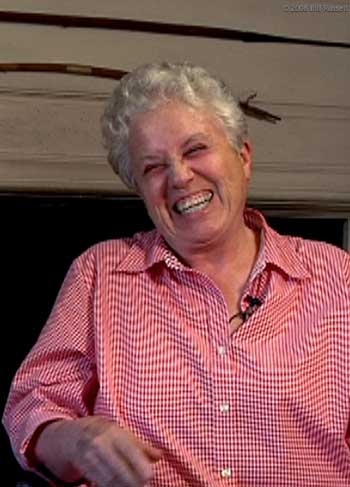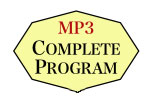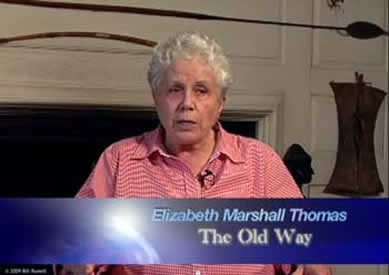For most of the 150,000 years since we evolved in Africa, people lived in “the old way”, reports Elizabeth Marshall Thomas. We were an important predator (not the top one she says, lions had that honor) among the fauna of the African savannah. She revisits and updates the experiences she and her family had in the 1950s in her book, The Old Way. Decades before Ms. Thomas wrote The Hidden Life of Dogs or Tribe of Tiger, she and her family were the first outsiders to live among the Bushmen in the Kalahari Desert in the 1950s.
“People assume that because they were hunter/gatherers that they had lots of superstitions, lots of magic beliefs to explain things. They didn't, not at all. The deer don't have magic to make things happen. The lions don't. Why would we? We didn't. They did not try to control the environment, as one does when one is an agriculturist. They controlled themselves.
“I wanted to re-examine what we had seen and the experiences we had had in the light of what has been discovered in the intervening years: the antiquity of the Bushmen, and things like water independence.
“People and lions are water dependent. They have to drink water every day. All the predators have to. There are only a few water holes so there isn't one for the lions and one for the people. It worked out best when they did their hunting at different times. The night is vastly preferable and the lions got the night. By day, the people used the whole territory, not only just drinking from the water hole but also for hunting.
“Antelope are water independent. They can go for days or a season, raising their inner temperature. If ours went up that extent we die, but they do fine. They spend their energy at night and stand in the shade in the daytime. They are a whole different story from those who need to drink water.”
It turns out, the large antelope known as the elan, hunted and eaten by people, lions and wild dogs alike, is rich in precious fat.
“There were no fat people, everybody was thin. Bushmen themselves had a very low fat diet and lots of exercise, so they spent lots of calories getting the calories that they were able to eat. We (humans) need some body fat in order to be able to menstruate or to ovulate. That's quite a wise evolutionary development because better to wait until you have that (fat), rather than waste the energy. If you have a very lean body and low weight and low fat you don't menstruate as quickly as you do otherwise, or as early in life. (Now) we are very young to menstruate. (They) were much older to menstruate, approximately 20.
“Our infant mortality in America is pretty high. The Bushmen had very healthy babies and a low birthrate, which is better. You could nurse one baby. If you had another baby before the first baby was self-sufficient, you were undernourished, you would malnourish two kids and you could lose both of them. There was infanticide but it was extremely rare, and they wouldn't need to because lactation prevents pregnancy.
“There are things about the antiquity of the Bushmen’s culture that we didn't know. A musicologist found very important music which was used at a woman's first menarche called ‘elan music’ (honoring the fat-rich antelope). This ‘elan music’ was also present in other language groups of other Bushmen language groups and also the noun-less speakers who are not exactly Bushmen but they're related. This means that way back before these groups diverged, somebody invented or composed (this) music and then they took it with them.”
Ms. Thomas encourages us all to disturb less and observe more, starting with domestic dogs and cats, wild birds, animals, waters and woodlands.
“As a result, the natural world comes closer to the house. The less you meddle with what's going on around you, the more the natural world will come to you.”
[This Program was recorded July 19, 2008, in Peterborough, New Hampshire, U.S.]

Elizabeth Marshall Thomas
... author, naturalist, ethologist. The Old Way: A Story of the First People is Ms. Thomas’ definitive exploration of humanity’s deep past. She combines her own and her family’s experiences as the first outsiders to live with the Bushmen in the Kalahara in the 1950s, with her 50 subsequent years of writing and study. Widely known for her non-fiction, The Hidden Life of Dogs, The Social Life of Dogs and Tribe of Tiger as well as her classics The Harmless People and Warrior Herdsmen, Ms. Thomas’ fiction includes Certain Poor Shepherds and two novels, Reindeer Moon and The Animal Wife. She also writes for The New Yorker, National Geographic, The Atlantic and The New York Review of Books.
| Audio Preview of Elizabeth Marshall Thomas |
 1:28
1:28 







